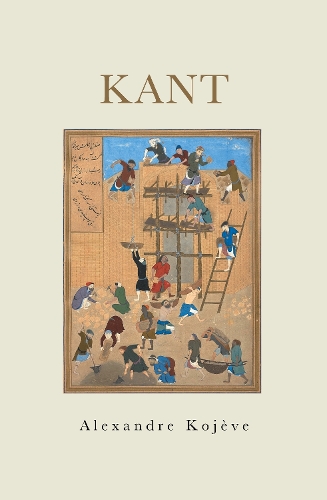
Kant
(Paperback, Paperback original)
Publishing Details
Kant
By (Author) Alexandre Kojve
Translated by Hager Weslati
Verso Books
Verso Books
2nd September 2025
Paperback original
United Kingdom
Classifications
General
Non Fiction
Social and political philosophy
History of ideas
193
Physical Properties
Paperback
272
Width 153mm, Height 234mm, Spine 17mm
307g
Description
During the early 1950s, Alexandre Kojve resumed his ambitious project to bring the analytic reason of Kantianism in line with Hegels logic and philosophy of history. Kant is one of the most extensive text fragments where Kojve turned his attention to the gaps left open in the system of critical philosophy. Published in its raw, unedited form in 1973, in the aftermath of the anti-Hegelian drift of the student-led revolt of May 68, the book has remained largely unexplored, despite its protean influence on various returns to Kant, from Weil to Deleuze, and from Foucault to Tosel and beyond. Kant is a deep and provocative text, equal in breadth and depth of insight to the famous Introduction to the Reading of Hegel. Kants philosophical system, Kojeve argues, is haunted by the Thing-in-itself, as the ultimate expression of bourgeois hypocrisy and its internally divided reason between action and discourse. Making a case for the post-historical moral imperative to turn away from infinite progress and the practical justification of the ideas of God and the immortality of the soul, Kant outlines the material conditions of possibility of revolutionary action within the twin horizon of accomplished and recollected history.
Reviews
In Kojve Kant finally found the reader prepared to philosophise with rather than about him. Beginning where Kant ends, in the Doctrine of Method, Kojve addresses fundamental questions to the critical philosophy situating it as the final gesture of a philosophy of transcendence before its transformation into the Hegelian system of knowledge. Hager Weslati's lucid translation finally makes Kojve's Kant available in English, providing a key text to understanding the full span and ambition of Kojve's history of philosophy as well as access to a unique episode in the French reception of Kant's critical philosophy. -- Howard Caygill
Kojve was a magician of thought. Undoubtedly, he was the inventor of the last grand narrative of philosophy and history, of which the neo-conservative ideologue Fukuyama was but a mediocre imitator. -- Pierre Macherey
Kojve's lectures made a deep impression on his listeners - to more various and influential effect than probably any others in France this century. -- Perry Anderson
Kojve spoke of Hegel's religious philosophy, the phenomenology of Spirit, master and slave, the struggle for prestige, the in-itself, the for-itself, nothingness, projects, the human essence as revealed in the struggle onto death and in the transformation of error into truth. Strange theses for a world beleaguered by fascism! -- Louis Althusser
Alexandre Kojve's originality and courage, it must be said, is to have perceived the impossibility of going any further, the necessity, consequently, of renouncing the creation of an original philosophy and, thereby, the interminable starting-over which is the avowal of the vanity of thought. -- Georges Bataille
A brilliant Russian migr who taught a highly influential series of seminars in Paris. Kojve had a major impact on the intellectual life of the continent. Among his students ranged such future luminaries as Jean-Paul Sartre and Raymond Aron. -- Francis Fukuyama
Author Bio
Alexandre Kojve (1902-1968) was one of the major philosophers of the 20th century. His famous lectures on Hegel and his provocative end of history thesis left an indelible mark on contemporary thought. By the end of the Second World War, he abandoned academic philosophy to embark on a diplomatic career. While occupying an influential position in French foreign trade diplomacy, Kojve worked on a series of manuscripts towards a system of knowledge, which have largely remained unpublished until well after this death. Initially dismissed as post-historical irony and play, Kojves post-war philosophical writings should open new perspectives on how we became post-historical and what ways we go from there.
